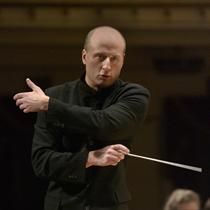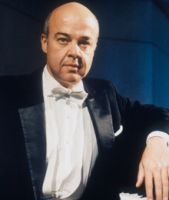
Järvi Ends 9th CSO Season Over the Rainbow Bridge
(first published in the Cincinnati Enquirer May 8, 2010)
Music that you knew – or thought you knew – made up the
final concert of the Cincinnati Symphony Orchestra's 2009-2010 season Thursday night (May 6) at
Music Hall.

Led by music director Paavo Järvi, it was an arch-romantic program including some of the most familiar moments in classical music. “Ride of the Valkyries” from Wagner’s “Ring” cycle was one of them -- the third of five orchestral excerpts from the “Ring” heard on the concert.
Another was Tchaikovsky’s
Piano Concerto No. 1. However, as performed
by guest artist Alexander Toradze, it was almost like hearing it for the first
time (Järvi had everything to do with this, since his collaboration with Toradze was particularly close and sympathetic.)

The well known introduction, with resounding piano chords accompanying the orchestra, grabbed listeners by the ears as usual, but after Toradze re-stated the theme, it became soft and tender. The entire first movement had a deep emotive aspect, with affective voicing of the piano part, liberal use of pedal and exquisite dovetailing of phrases by Toradze, Järvi and the CSO.
The second movement had a gentle, faraway aspect. Flutist Jasmine Choi’s opening solo floated on the air, while principal cellist Ilya Finkelshteyn, who seems able to draw upon the entire aural spectrum, crafted an uncanny tone to complement Toradze. Details rarely heard (one of Järvi's strengths as a conductor) emerged in the finale, where the CSO’s crisp articulation closely matched Toradze’s. As if it had been his goal throughout, he poured all of his ardor into the final melody, then charged lickety-split to the end. Bear hugs, bravos and a standing ovation followed, but no encore.
Järvi assembled his “Ring” selections into five-movements, without regard to the sequence of events in the operas. This worked better in theory than practice, not only for those familiar with the “Ring who would expect the “Immolation Scene” from “Götterdämmerung” to be the conclusion, but on purely musical grounds. “Entrance of the Gods into Valhalla” from “Rheingold” seemed a lightweight, tacked-on end after the wrenching “Siegried’s Death and Funeral Music” (Götterdämmerung) that preceded it.
Still, if continuity did not bother you, there were plenty
of moments to savor. “Wotan’s Farewell
and Magic Fire Scene” (“Die Walküre”)
made a thrilling opener, beginning with the huge rush of emotion preceding the
god’s heartbreaking “Lebwohl” (“Farewell”) to his daughter Brünnhilde, followed
by the flickering “Fire Music” with harpists Gillian Benet Sella and Liya Huang (Wagner actually specifies six harps in the score!).
“Dawn and Siegfried’s Rhine Journey” (Götterdämmerung”) broke softly in the CSO horns
and clarinets (principal Richard Hawley, with Ronald Aufmann on bass clarinet). Principal French horn Elizabeth Freimuth had
a star turn in the "Rhine Journey,” where she exited quickly to sound
Siegfried’s horn calls from the wings.
Järvi glanced mischievously over his shoulder at the audience as he cued “Ride of the Valkyries.” This was the best performed excerpt, no doubt because the orchestra is more accustomed to playing it than other parts of the “Ring.”
Principal trumpet Robert Sullivan (sounding the sword
leitmotif) and the entire brass section shone in “Siegfried’s Death,” a
powerful excerpt framed by the squirrely death motif in the low strings.
As for Valhalla, it did not burn this time, as it does at the conclusion of Götterdämmerung," final opera in the "Ring" cycle. With "Entrance of the Gods into Valhalla," conclusion of the first opera "Rheingold," one truly was, as legendary comedienne Anna Russell stated in her famous "Ring" commentary, "exactly where you started 20 hours ago." It was a stately procession, broken only by the song of the Rhine Maidens (oboes) mourning the loss of their gold. The concert and with it, Järvi's ninth and next-to-last season with the CSO, ended with soaring repetitions of the "Rhine" motif, over the rainbow bridge in the dwelling of the gods.
Recognized at intermission was CSO principal percussionist William Platt, who retires this season after 40 years with the orchestra. Veteran of many CSO "Boleros" (Ravel), where his hand on the snare drum provided the pulse for the orchestra, Platt sounded Donner's hammer (the thunder god) in "Entrance into Valhalla" with a resounding cymbal crash.
Repeat is 8 p.m. Saturday at Music Hall, to be followed by a free after-party with Järvi and the musicians in the lobby. Tickets and information at (513) 381-3300.